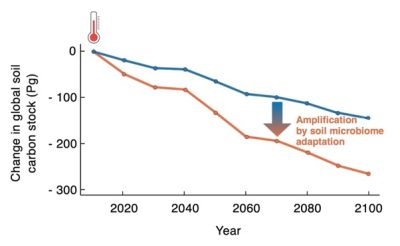Posted by Design Studio
18 August 2025
Challenge 2: Soil Carbon
Soils store more carbon than the atmosphere and vegetation combined, making microbial processes within them critical to Earth’s climate system. This study investigates whether microbial communities’ capacity to adapt to warming—through ecological and evolutionary changes in their functional traits—could significantly influence global carbon cycle projections. The authors focus on a key microbial trait: the allocation of carbon to extracellular enzymes that break down soil organic matter, a process fundamental to carbon release.
Using a mechanistic soil carbon model enhanced with evolutionary game theory, the study simulates how microbes adjust their enzyme production strategies to optimize fitness under warming. The model predicts that as temperatures rise, microbial communities evolve to allocate more resources to enzyme production, accelerating the decomposition of soil organic matter and increasing carbon emissions. When scaled globally and forced by future temperature projections (RCP8.5), this adaptive response leads to nearly twice the global soil carbon loss by 2100 compared to models without trait evolution.
Importantly, this amplification effect is not uniform: it is most pronounced in colder regions like the Arctic, where both warming and the microbial response are stronger. The findings are robust across alternative scenarios of microbial physiology and climate inputs, and they are broadly supported by empirical studies, including metagenomic surveys. The work highlights a major omission in Earth system models—the lack of trait adaptation—and shows that incorporating microbial evolution may be essential to accurately forecast climate-carbon feedbacks

Read the publication in full. Microbiome adaptation could amplify modeled projections of global soil carbon loss with climate warming